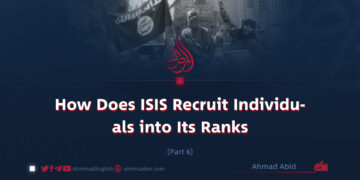Part 12
Written by: Mawlawi Ahmad Ali
Assistance and cooperation with disbelievers against Muslims (Muẓāharah ‘alā al-Muslimīn): Imam Tahawi’s Consensus (ijma’)
Imam Tahawi (may Allah have mercy on him) narrated a consensus regarding someone who claims to be Muslim but assists and cooperates with disbelievers, such as spying on Muslims for them. He states that such a person should not be killed because they are Muslim. For instance, Ibn Hajar (رحمه الله) writes in Fath al-Bari, Volume 12, Page 310, while discussing the story of Hatib ibn Abi Balta’ah (رضي الله عنه):
وَفِيهِ الرَّدُّ عَلَى مَنْ كَفَّرَ الْمُسْلِمَ بِارْتِكَابِ الذَّنْبِ وَعَلَى مَنْ جَزَمَ بِتَخْلِيدِهِ فِي النَّارِ، وَعَلَى مَنْ قَطَعَ بِأَنَّهُ لَا بُدَّ وَأَنْ يُعَذَّبَ وَفِيهِ أَنَّ مَنْ وَقَعَ مِنْهُ الْخَطَأُ لَا يَنْبَغِي لَهُ أَنْ يَجْحَدَهُ، بَلْ يَعْتَرِفُ وَيَعْتَذِرُ، لِئَلَّا يَجْمَعَ بَيْنَ ذَنْبَيْنِ، وَفِيهِ جَوَازُ التَّشْدِيدِ فِي اسْتِخْلَاصِ الْحَقِّ وَالتَّهْدِيدِ بِمَا لَا يَفْعَلُهُ الْمُهَدِّدُ تَخْوِيفًا لِمَنْ يُسْتَخْرَجُ مِنْهُ الْحَقُّ، وَفِيهِ هَتْكُ سِتْرِ الْجَاسُوسِ، وَقَدِ اسْتَدَلَّ بِهِ مَنْ يَرَى قَتْلَهُ مِنَ الْمَالِكِيَّةِ لِاسْتِئْذَانِ عُمَرَ فِي قَتْلِهِ، وَلَمْ يَرُدَّهُ النَّبِيُّ صَلَّى اللَّهُ عَلَيْهِ وَسَلَّمَ عَنْ ذَلِكَ، إِلَّا لِكَوْنِهِ مِنْ أَهْلِ بَدْرٍ، وَمِنْهُمْ مَنْ قَيَّدَهُ بِأَنْ يَتَكَرَّرَ ذَلِكَ مِنْهُ، وَالْمَعْرُوفُ عَنْ مَالِكٍ يَجْتَهِدُ فِيهِ الْإِمَامُ، وَقَدْ نَقَلَ الطَّحَاوِيُّ الْإِجْمَاعَ عَلَى أَنَّ الْجَاسُوسَ الْمُسْلِمَ لَا يُبَاحُ دَمُهُ، وَقَالَ الشَّافِعِيَّةُ وَالْأَكْثَرُ يُعَزَّرُ، وَإِنْ كَانَ مِنْ أَهْلِ الْهَيْئَاتِ يُعْفَى عَنْهُ، وَكَذَا قَالَ الْأَوْزَاعِيُّ وَأَبُو حَنِيفَةَ: يُوجَعُ عُقُوبَةً وَيُطَالُ حَبْسُهُ، وَفِيهِ الْعَفْوُ عَنْ زَلَّةِ ذَوِي الْهَيْئَةِ.
Imam Razi’s Classification of Alliances with Non-Muslims
Imam Razi (may Allah have mercy on him) states in his Tafsir al-Kabir (Vol. 8, p. 192) that the association of a Muslim with a disbeliever can fall into three categories as follows:
1. The First Case:
If a person befriends disbelievers due to their disbelief, is pleased with their disbelief, and supports it, this form of friendship is regarded as disbelief (kufr). This is because it involves accepting the false religion of disbelief as valid, and approving of disbelief itself is disbelief.
2. The Second Case:
If a person maintains a superficial, outward friendship with disbelievers purely for worldly, social, or societal reasons, such as coexisting peacefully in worldly matters, this is permissible (ja’iz).
3. The Third Case:
This is an intermediate case that is neither disbelief (kufr) nor permissible (ja’iz), but rather forbidden (haram). This involves assisting and cooperating with disbelievers against Muslims out of love, familial ties, or friendship, while believing that the religion of the disbelievers is false. Although this does not constitute disbelief, it is strictly prohibited.
Imam Razi (رحمه الله) explains:
وَاعْلَمْ أَنَّ كَوْنَ الْمُؤْمِنِ مُوَالِيًا لِلْكَافِرِ يَحْتَمِلُ ثَلَاثَةَ أَوْجُهٍ أَحَدُهَا: أَنْ يَكُونَ رَاضِيًا بِكُفْرِهِ وَيَتَوَلَّاهُ لِأَجْلِهِ، وَهَذَا مَمْنُوعٌ مِنْهُ؛ لِأَنَّ كُلَّ مَنْ فَعَلَ ذَلِكَ كَانَ مُصَوِّبًا لَهُ فِي ذَلِكَ الدِّينِ، وَتَصْوِيبُ الْكُفْرِ كُفْرٌ وَالرِّضَا بِالْكُفْرِ كُفْرٌ، فَيَسْتَحِيلُ أَنْ يَبْقَى مُؤْمِنًا مَعَ كَوْنِهِ بِهَذِهِ الصِّفَةِ.
فَإِنْ قِيلَ: أَلَيْسَ أَنَّهُ تَعَالَى قَالَ: وَمَنْ يَفْعَلْ ذلِكَ فَلَيْسَ مِنَ اللَّهِ فِي شَيْءٍ وَهَذَا لَا يُوجِبُ الْكُفْرَ فَلَا يَكُونُ دَاخِلًا تَحْتَ هَذِهِ الْآيَةِ، لِأَنَّهُ تعالى قال: ﴿يٰۤاَيُّهَا الَّذِيْنَ اٰمَنُوْا﴾ فَلَا بُدَّ وَأَنْ يَكُونَ خِطَابًا فِي شَيْءٍ يبقى المؤمن معه مؤمناو ثانيها: الْمُعَاشَرَةُ الْجَمِيلَةُ فِي الدُّنْيَا بِحَسَبِ الظَّاهِرِ، وَذَلِكَ غَيْرُ مَمْنُوعٍ مِنْهُ.
وَالْقِسْمُ الثَّالِثُ: وَهُوَ كَالْمُتَوَسِّطِ بَيْنَ الْقِسْمَيْنِ الْأَوَّلَيْنِ هُوَ أَنَّ مُوَالَاةَ الْكُفَّارِ بِمَعْنَى الرُّكُونِ إِلَيْهِمْ وَالْمَعُونَةِ، وَالْمُظَاهَرَةِ، وَالنُّصْرَةِ إِمَّا بِسَبَبِ الْقَرَابَةِ، أَوْ بِسَبَبِ الْمَحَبَّةِ مَعَ اعْتِقَادِ أَنَّ دِينَهُ بَاطِلٌ فَهَذَا لَا يُوجِبُ الْكُفْرَ إِلَّا أَنَّهُ مَنْهِيٌّ عَنْهُ؛ لِأَنَّ الْمُوَالَاةَ بِهَذَا الْمَعْنَى قَدْ تَجُرُّهُ إِلَى اسْتِحْسَانِ طَرِيقَتِهِ وَالرِّضَا بِدِينِهِ، وَذَلِكَ يُخْرِجُهُ عَنِ الْإِسْلَامِ فَلَا جَرَمَ هَدَّدَ اللَّهُ تَعَالَى فِيهِ فَقَالَ: وَمَنْ يَفْعَلْ ذلِكَ فَلَيْسَ مِنَ اللَّهِ فِي شَيْءٍ.
The Preference of the Sahabah (رضي الله عنهم) Between the Romans and the Persians
Note:
It is important to note that regarding disbelief (kufr), finding a disbelieving religion commendable or being pleased with it constitutes disbelief only if this approval is in opposition to Islam. However, if the preference is in comparison to another disbelieving religion, it does not constitute disbelief.
For instance, during the battles between the Romans and the Persians, the Muslims in Makkah expressed a preference for the Romans to emerge victorious. This was due to the Romans being regarded as People of the Book (Ahl al-Kitab), who acknowledged the concept of the Day of Judgment (Qiyamah) and adhered to certain divine principles.
Conversely, the Mushrikeen of Makkah preferred the Persians to succeed, since the Persians were Magians (Majus), idolaters similar to themselves, and not followers of any revealed Book or divine religion. Furthermore, the Persians denied the concept of resurrection after death (ba‘th ba‘d al-mawt), aligning more closely with the beliefs of the Mushrikeen.
Imam Qurtubi (رحمه الله) narrates from Ibn Abbas (رضي الله عنه):
قَالَ ابْنِ عَبَّاسٍ فِي قَوْلِ اللَّهِ عَزَّ وَجَلَّ: ﴿الٓـمّٓ ١ غُلِبَتِ الرُّوْمُ ٢ فِىْۤ اَدْنَى الْاَرْضِ﴾ قَالَ: غَلَبَتْ وَغُلِبَتْ، قَالَ: كَانَ الْمُشْرِكُونَ يُحِبُّونَ أَنْ يَظْهَرَ أَهْلُ فَارِسَ عَلَى الرُّومِ، لِأَنَّهُمْ وَإِيَّاهُمْ أَهْلُ أَوْثَانٍ، وَكَانَ الْمُسْلِمُونَ يُحِبُّونَ أَنْ تَظْهَرَ الرُّومُ عَلَى فَارِسَ، لِأَنَّهُمْ أَهْلُ كِتَابٍ.
عَنْ نِيَارِ بْنِ مُكْرَمٍ الْأَسْلَمِيِّ قَالَ: لَمَّا نَزَلَتْ ﴿الٓـمّٓ ١ غُلِبَتِ الرُّوْمُ ٢ فِىْۤ اَدْنَى الْاَرْضِ وَهُمْ مِّنْۢ بَعْدِ غَلَبِهِمْ سَيَغْلِبُوْنَ ٣ فِىْ بِضْعِ سِنِيْنَ﴾ وَكَانَتْ فَارِسُ يَوْمَ نَزَلَتْ هَذِهِ الْآيَةُ قَاهِرِينَ لِلرُّومِ، وَكَانَ الْمُسْلِمُونَ يُحِبُّونَ ظُهُورَ الرُّومِ عَلَيْهِمْ، لِأَنَّهُمْ وَإِيَّاهُمْ أَهْلُ كِتَابٍ، وَفِي ذَلِكَ نَزَلَ قَوْلُ اللَّهِ تَعَالَى: ﴿وَيَوْمَئِذٍ يَّفْرَحُ الْمُؤْمِنُوْنَ ٤ بِنَصْرِ اللّٰهِؕ يَنْصُرُ مَنْ يَّشَآءُؕ وَهُوَ الْعَزِيْزُ الرَّحِيْمُ﴾ وَكَانَتْ قُرَيْشُ تُحِبُّ ظُهُورَ فَارِسَ؛ لِأَنَّهُمْ وَإِيَّاهُمْ لَيْسُوا بِأَهْلِ كِتَابٍ وَلَا إِيمَانٍ بِبَعْثٍ، فَلَمَّا أَنْزَلَ اللَّهُ هَذِهِ الْآيَةَ خَرَجَ أَبُو بَكْرٍ الصِّدِّيقُ رَضِيَ اللَّهُ عَنْهُ يَصِيحُ فِي نَوَاحِي مَكَّةَ: ﴿الٓـمّٓ ١ غُلِبَتِ الرُّوْمُ ٢ فِىْۤ اَدْنَى الْاَرْضِ وَهُمْ مِّنْۢ بَعْدِ غَلَبِهِمْ سَيَغْلِبُوْنَ ٣ فِىْ بِضْعِ سِنِيْنَ﴾
Muslims favored the Romans’ victory over the Persians because of the Romans’ religion. The Romans were associated with a divine religion and book, and they believed in resurrection after death, just as Muslims also adhered to a divine religion, book, and belief in resurrection. These shared religious beliefs were common ground between the Muslims and the Romans, which did not exist with the Persians because they were Magians.
This preference stemmed from shared beliefs, not approval of Christian theology over Islam.
Because of these shared religious beliefs, a natural and instinctive solidarity developed for the Romans against the Magians. For this reason, in some narrations, Abu Bakr as-Siddiq (رضي الله عنه) referred to the Romans as “our brothers” (إخواننا) in the context of their opposition to the Magians.
This solidarity and sympathy with the disbelieving Romans, who were Christians, stemmed from their religion. The phrase إخواننا (our brothers) was used for them due to their shared beliefs in a divine religion and book. However, all of this was only in opposition to another false religion (Magianism). It must be emphasized that any sympathy, solidarity, or affection for a false religion or system in opposition to Islam—and desiring its victory or success—is clearly disbelief (kufr).
As Allama Alusi (رحمه الله) mentions in his Tafsir Ruh al-Ma’ani under the commentary of Surah Ar-Rum:
روي أن فارس غزوا الروم فوافوهم بأذرعات وبصرى، فغلبوا عليهم، فبلغ ذلك النبي صلى الله تعالى عليه وسلم وأصحابه وهم بمكة، فشق ذلك عليهم، وكان صلى الله تعالى عليه وسلم يكره أن يظهر الأميون من المجوس على أهل الكتاب من الروم، وفرح الكفار بمكة وشمتوا، فلقوا أصحاب النبي صلى الله تعالى عليه وسلم، فقالوا:
إنكم أهل كتاب، والنصارى أهل كتاب، وقد ظهر إخواننا من أهل فارس على إخوانكم من أهل الكتاب، وإنكم إن قاتلتمونا لنظهرن عليكم، فأنزل الله تعالى: ﴿الٓـمّٓ ١ غُلِبَتِ الرُّوْمُ ٢﴾ الآيات، فخرج أبو بكر رضي الله تعالى عنه إلى الكفار، فقال: أفرحتم بظهور إخوانكم على إخواننا، فلا تفرحوا ولا يفرسنّ الله تعالى عينكم، فوالله! ليظهرنّ الروم على فارس. أخبرنا بذلك نبينا صلى الله تعالى عليه وسلم.
Hafiz Ibn Kathir (رحمه الله) also mentions similar narrations in the Tafsir of Surah Ar-Rum. He states:
قَالَ الْإِمَامُ أَحْمَدُ: حَدَّثَنَا مُعَاوِيَةُ بْنُ عَمْرٍو، حَدَّثَنَا أَبُو إِسْحَاقَ عَنْ سُفْيَانَ عَنْ حَبِيبِ بْنِ أَبِي عَمْرَةَ عَنْ سَعِيدِ بْنِ جُبَيْرٍ عَنِ ابْنِ عَبَّاسٍ رَضِيَ اللَّهُ عَنْهُمَا فِي قَوْلِهِ تَعَالَى: ﴿الٓـمّٓ ١ غُلِبَتِ الرُّوْمُ ٢ فِىْۤ اَدْنَى الْاَرْضِ﴾ قَالَ: غُلِبَتْ وَغَلَبَتْ، قَالَ: كَانَ الْمُشْرِكُونَ يُحِبُّونَ أَنْ تَظْهَرَ فَارِسُ عَلَى الرُّومِ؛ لِأَنَّهُمْ أَصْحَابُ أَوْثَانٍ، وَكَانَ الْمُسْلِمُونَ يُحِبُّونَ أَنْ تَظْهَرَ الرُّومُ عَلَى فَارِسَ؛ لِأَنَّهُمْ أَهْلُ كِتَابٍ.
Similarly, on a preceding page, it is narrated by Abdullah bin Mas’ud (may Allah be pleased with him) that the Muslims wished for the Romans to prevail over the Persians because the Romans were People of the Book, as stated by him:
عَنْ عَبْدِ اللَّهِ بْنِ مَسْعُودٍ رَضِيَ اللَّهُ عنه قَالَ: كَانَ فَارِسُ ظَاهِرًا عَلَى الرُّومِ، وَكَانَ الْمُشْرِكُونَ يُحِبُّونَ أَنْ تَظْهَرَ فَارِسُ عَلَى الرُّومِ. وَكَانَ الْمُسْلِمُونَ يُحِبُّونَ أَنْ تَظْهَرَ الرُّومُ عَلَى فَارِسَ؛ لِأَنَّهُمْ أَهْلُ كِتَابٍ وَهُمْ أَقْرَبُ إِلَى دِينِهِمْ.
Imam Tirmidhi (رحمه الله) also narrated through the chain of Niyar bin Mukram Al-Aslami that the Muslims preferred that the Romans triumph over the Persians because both (Muslims and Romans) were People of the Book. However, the polytheists preferred that the Romans be defeated and the Persians prevail, as neither group (the Persians and polytheists) were People of the Book, nor did they believe in resurrection after death.
When the verse of the Qur’an was revealed, stating that the Romans would soon triumph within a few years, Hazrat Abu Bakr Siddiq (رضي الله عنه), out of joy, walked through the streets of Makkah, announcing this prophecy and declaring its glad tidings, as stated:
قَالَ أَبُو عِيسَى التِّرْمِذِيُّ: حَدَّثَنَا مُحَمَّدُ بْنُ إِسْمَاعِيلَ، حَدَّثَنَا إِسْمَاعِيلُ بْنُ أَبِي أُوَيْسٍ، أَخْبَرَنِي ابْنُ أَبِي الزِّنَادِ عَنْ عُرْوَةَ بْنِ الزُّبَيْرِ عَنْ نِيَارِ بْنِ مُكْرَمٍ الْأَسْلَمِيِّ قَالَ: لَمَّا نَزَلَتْ ﴿الٓـمّٓ ١ غُلِبَتِ الرُّوْمُ ٢ فِىْۤ اَدْنَى الْاَرْضِ وَهُمْ مِّنْۢ بَعْدِ غَلَبِهِمْ سَيَغْلِبُوْنَ ٣ فِىْ بِضْعِ سِنِيْنَ﴾ فَكَانَتْ فَارِسُ يَوْمَ نَزَلَتْ هَذِهِ الْآيَةُ قَاهِرِينَ لِلرُّومِ، وَكَانَ الْمُسْلِمُونَ يُحِبُّونَ ظُهُورَ الرُّومِ عَلَيْهِمْ؛ لِأَنَّهُمْ وَإِيَّاهُمْ أَهْلُ كِتَابٍ، وفي ذلك قوله الله: ﴿وَيَوْمَئِذٍ يَّفْرَحُ الْمُؤْمِنُوْنَ ٤ بِنَصْرِ اللّٰهِؕ يَنْصُرُ مَنْ يَّشَآءُؕ وَهُوَ الْعَزِيْزُ الرَّحِيْمُ ٥﴾ وَكَانَتْ قُرَيْشٌ تُحِبُّ ظُهُورَ فَارِسَ، لِأَنَّهُمْ وَإِيَّاهُمْ لَيْسُوا بِأَهْلِ كِتَابٍ، وَلَا إِيمَانٍ بِبَعْثٍ، فَلَمَّا أَنْزَلَ اللَّهُ هَذِهِ الْآيَةَ، خَرَجَ أَبُو بَكْرٍ يَصِيحُ فِي نَوَاحِي مَكَّةَ ﴿الٓـمّٓ ١ غُلِبَتِ الرُّوْمُ ٢ فِىْۤ اَدْنَى الْاَرْضِ وَهُمْ مِّنْۢ بَعْدِ غَلَبِهِمْ سَيَغْلِبُوْنَ ٣ فِىْ بِضْعِ سِنِيْنَ﴾
The purpose of all these narrations is to illustrate that expressing love or support for one disbelief system or religion over another does not constitute disbelief (kufr). However, if such support is shown in opposition to Islam, then it is indeed kufr. For example, in India, esteemed figures such as Shaykh al-Islam Hazrat Maulana Hussain Ahmad Madani (رحمه الله) and others supported secularism.
Although secularism is indeed disbelief, the support provided by Islamic scholars and ordinary Muslims in India for secularism was in opposition to Hinduism, not Islam. This is because, under secularism in India, there is some degree of protection for Muslim mosques, madrasas, and religious centers. Conversely, under Hinduism, these institutions face constant threats without a legal framework for their safeguarding.
Similarly, in the Islamic world, some Islamic groups strive to establish an Islamic system or safeguard Islamic values through democratic means. When Islamic values or sacred matters are endangered, they resort to peaceful public protests, file cases in courts under the democratic system, put pressure on governments, and to some extent, safeguard Islamic values and sanctities through these democratic methods. They believe that achieving such objectives is relatively more difficult under authoritarian regimes or military rule. Hence, they advocate for democracy in their countries.
However, expressing such slogans against Islam constitutes clear and explicit kufr. Some secular parties or groups consider Islam merely a personal religion, denying its status as a comprehensive system or model of governance. They advocate for a democratic system where laws are not based on any religion, and truth is determined solely by the majority decision of the parliament.



















































